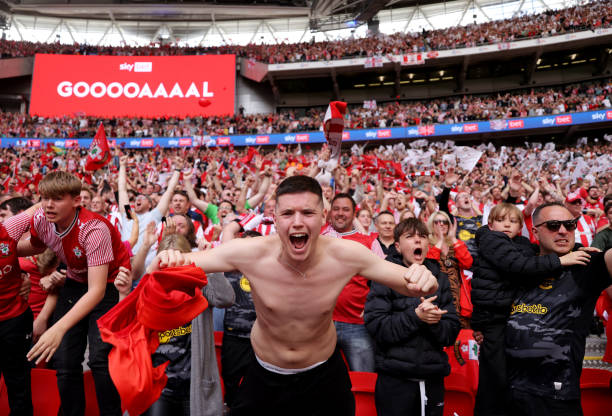
Introduction
The English Championship, the second tier of English football, is often overshadowed by the global appeal of the Premier League. However, those familiar with the competition recognize it as one of the most challenging and unpredictable leagues in world football. With intense competition, a grueling fixture schedule, financial disparities, and high stakes for promotion, the Championship is a battleground where even the strongest teams struggle to assert dominance.
Unpredictability and Competitiveness
Unlike the Premier League, where a handful of clubs tend to dominate, the Championship is highly competitive. Each season, the race for promotion and survival is fiercely contested, with no guarantees for even the wealthiest clubs. The level of competition is highlighted by the fact that any team can beat another on any given matchday, making it one of the most unpredictable leagues in the world.

The league features 24 teams, meaning clubs play 46 matches in a season—eight more than the Premier League. This extended schedule ensures that form, fitness, and squad depth play crucial roles in determining success. With such small margins separating teams, the Championship often sees clubs that finished mid-table one season competing for promotion the next.
The Grueling Fixture Schedule
One of the most demanding aspects of the Championship is its relentless fixture list. With 46 league matches, plus domestic cup competitions, teams often find themselves playing twice a week. The fixture congestion places immense physical and mental demands on players, requiring deep squad rotation and excellent fitness management.
Unlike many top leagues that have winter breaks, the Championship continues through the festive period, making it even more exhausting. This tight schedule contributes to the unpredictability of results, as teams frequently have to rotate players due to fatigue and injuries.
Financial Disparities and Parachute Payments
The Championship is home to a mix of clubs with varying financial capabilities. Some clubs receive “parachute payments” after relegation from the Premier League, giving them a significant financial advantage over their rivals. These payments help former Premier League clubs maintain high wages and attract quality players, making the competition even tougher for smaller, less financially stable teams.
However, having more financial resources does not always guarantee success. Many well-funded clubs have struggled to secure promotion despite heavy investment, illustrating how difficult it is to navigate the Championship successfully. Clubs without parachute payments must rely on shrewd recruitment, strong academy systems, and effective managerial strategies to compete.
The High Stakes of Promotion and Relegation
The English Championship offers three promotion spots to the Premier League—two automatic and one through the playoffs. The financial and sporting rewards of promotion are immense, with clubs gaining access to lucrative broadcasting revenues and increased commercial opportunities. The pressure to achieve promotion leads to intense competition at the top of the table, with multiple clubs fighting for a coveted place in the Premier League.
Conversely, the battle to avoid relegation to League One is equally intense. The drop to the third tier of English football can have severe financial consequences for clubs, often resulting in budget cuts and player departures. The fear of relegation keeps teams fighting until the final weeks of the season, ensuring the league remains highly competitive throughout.

Quality of Teams and Players
The Championship features a blend of experienced professionals, young talents, and former Premier League stars. The league has become a proving ground for young players looking to develop before making the step up to the Premier League. Many top English and international players have honed their skills in the Championship before achieving success at higher levels.
Additionally, many clubs employ top-tier managers, some of whom have Premier League or international experience. The tactical battles between managers add an extra layer of intrigue to the competition, with teams employing diverse playing styles ranging from possession-based football to direct, physical approaches.

The Playoff Drama
One of the most thrilling aspects of the Championship is the playoff system. Teams finishing between third and sixth place compete in a high-stakes knockout competition to determine the third promoted team. The playoff final, held at Wembley Stadium, is often dubbed “the richest game in football” due to the financial windfall that promotion brings.
This system ensures that the season remains exciting until the very end, as teams fight for a chance to reach the Premier League. The unpredictability of the playoffs means that even teams that finished significantly behind third place can secure promotion, adding to the league’s reputation for drama.
SUGGESTED FOR YOU
9 Unbelievable Transfers That Shocked English Football: The Craziest Deadline Day Deals in History
10 Premier League Evolutionary Defining Moments : A Powerful Journey Through History
Fan Engagement and Atmosphere
Championship clubs boast some of the most passionate fan bases in English football. Many clubs have deep-rooted histories and local rivalries that add intensity to matches. The stadium atmosphere in the Championship is often electric, with loyal supporters backing their teams through thick and thin.
While Premier League stadiums attract global audiences, the Championship retains a traditional football culture, where passionate home and away support plays a crucial role. This connection between clubs and their local communities adds another layer of uniqueness to the league.
CHECK OUT TOP 3 FREE BETTING PREDICTION SITES
Accuratepredict.com Soccerpredictions.net Betloy.com
Conclusion
The English Championship stands as one of the toughest leagues in world football due to its intense competition, grueling schedule, financial disparities, and the high stakes involved. The unpredictability of results, the quality of players, and the passionate fanbase further contribute to its reputation as a battleground for aspiring and established football clubs alike.
For players, managers, and clubs, navigating the Championship successfully requires resilience, adaptability, and a strong squad. Whether fighting for promotion, battling relegation, or simply aiming for stability, every match presents a new challenge. It is this relentless nature that makes the Championship one of the most exciting and difficult leagues in world football.









